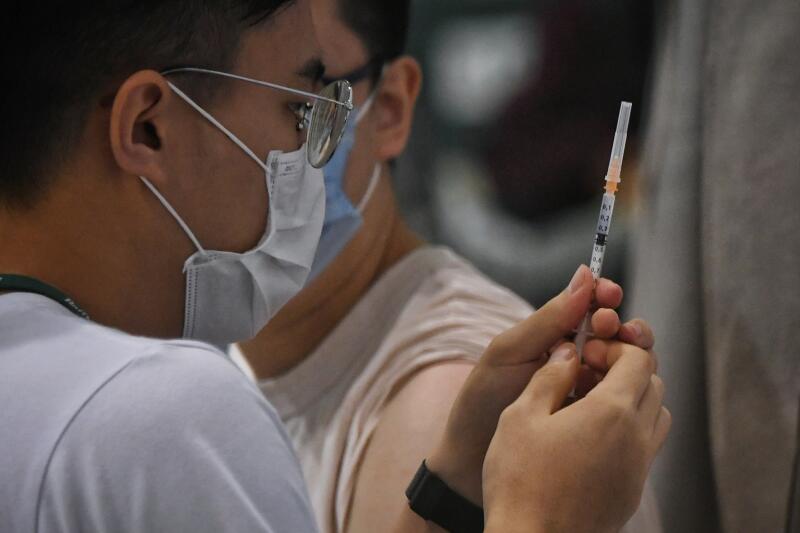Will those who are vaccinated need Covid-19 booster shots and, if so, when?
Sign up now: Get ST's newsletters delivered to your inbox

Research on the longevity of the protective effects of vaccines is ongoing.
ST PHOTO: KUA CHEE SIONG
SINGAPORE - Discussion about the need for annual Covid-19 booster shots has come to the fore, with news of some infections among people who have been vaccinated.
Prime Minister Lee Hsien Loong, in an address on television last week, hinted that such booster shots may be needed.
Some experts here as well as overseas concur that they may be useful.
But it is still early days yet on the question of exactly when such shots may be needed, as the duration of the immunity generated by vaccination is yet unclear, they said.
"Booster shots are necessary not just if the protective effects of vaccines wane, but also if new coronavirus variants become increasingly resistant to present vaccines," said Professor Teo Yik Ying, dean of the Saw Swee Hock School of Public Health at the National University of Singapore (NUS).
"For the latter, it's not specifically a booster shot per se, since it will actually be an updated vaccine very much like annual flu shots that we already have now."
Prof Teo believes that a clearer picture will emerge in the second half of this year, though he said it would always be difficult to predict the impact of new variants.
Research on the longevity of the protective effects of vaccines is ongoing.
Professor Ooi Eng Eong of Duke-NUS Medical School's Emerging Infectious Diseases programme pointed out that vaccination or infection produces not just antibodies but also memory immune cells.
"These memory cells can be activated very rapidly upon Sars-CoV-2 infection to prevent disease development and development of severe disease," he said.
"We will need to determine how long antibodies against Sars-CoV-2 last and how well these memory cells are preserved in the body over time to know when to boost with a third shot."
Sars-CoV-2 is the virus that causes Covid-19.
Another way of knowing when to administer booster shots and whether a vaccine against a variant of concern will be needed is through active surveillance of the Covid-19 virus in vaccinated people, said Prof Ooi.
This is to see if there is a rise in the number of symptomatic cases among them.
Once the majority of the population here is vaccinated, the number of cases should drop dramatically, as is the case in places such as Israel, the United States and Britain, Prof Ooi said.
"At that point, active surveillance will need to be carried out on selected patients (who have) flu-like illness," he added.
"As vaccines can prevent severe disease, the first sign that immunity is waning would be a rising trend of symptomatic Sars-CoV-2 infection among vaccinated individuals."
Discussion about the need for annual booster shots was fuelled by the spread of new coronavirus variants, some of which appeared to affect the effectiveness of current vaccines.
Vaccine makers such as Pfizer and Moderna are already studying booster shots.
Bahrain has started administering a Pfizer jab as a booster, six months after its residents received the Sinopharm vaccine.
Government officials and experts have said that with Covid-19 likely to become endemic, annual shots could turn out to be the norm, much like flu jabs.
Flu vaccines need to be updated as flu viruses are constantly changing, and also because a person's immunity wanes over time.
But Prof Ooi said that Covid-19 mRNA vaccines, like the Pfizer-BioNTech and Moderna ones used here, are "fundamentally different" from flu vaccines.
"Flu vaccines are composed of chemically inactivated influenza viruses. Such vaccines trigger antibody development but are not good in generating strong killer T-cell responses," he said.
Thus, he said, influenza viruses that "drift" genetically can overcome immunity to cause breakthrough infection and disease.
"On the other hand, mRNA vaccination produces strong antibody and T-cell responses."
Even if the Covid-19 virus evolves to escape antibody response, it would still have to get past killer T cells to fully overcome the immune system, he said.
The long-term game plan for countries to live with endemic Covid-19 may include certain privileges for people who have an updated vaccination record, said Prof Teo.
This means that those who are unvaccinated or miss their booster shots may be subject to additional tests or inconvenience when they participate in activities involving a large crowd, he added.


